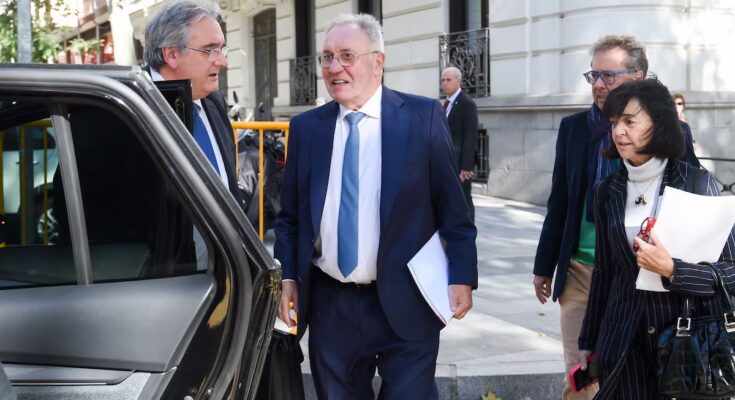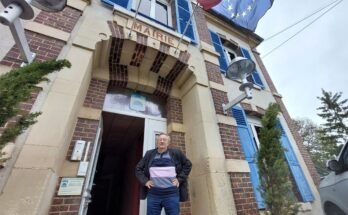The president of the Sidenor steelworks, José Antonio Jainaga, has denied that the steel he sold to an Israeli company to make weapons, in the midst of the massacre in Gaza, was not subject to government authorization. The Basque engineer defended himself on Wednesday before National Tribunal judge Francisco de Jorge against charges of smuggling crimes, as well as alleged complicity in a crime against humanity or genocide. In his deposition as an investigator, which lasted about 40 minutes and in which he only answered questions from his lawyers, he indicated that he had complied with current legislation, since at the time of the sales there were no limitations on commercial relations with that country.
The magistrate investigates the head of the steelworks based in Basauri (Bizkaia) and two other managers following a complaint from the Association of the Palestinian Community of Catalonia-Holy Land, according to which Sidenor had made periodic shipments of steel to the Israel Military Industries (IMI), a company that produces both heavy and light weapons. The complainants point out that the last shipment made took place on 10 June 2025, when Sidenor, via the cargo ship MV VELA, delivered 393 tonnes of steel to IMI Systems, via the port of Haifa (Israel).
The head of the Central Court of Education number 1 of the National Court, Francisco de Jorge, who for four months conducted the investigations in secret summary – revoked on October 23 – is investigating how Sidenor allegedly carried out a sale of steel to IMI, with “full knowledge that the material sold to Israel would be used for the manufacture of weapons”, and without having requested the corresponding authorization from the Government and without registering in the corresponding register, “as stated in an official letter from the General Information Commissioner (of the Police National) of 10 September”.
Interpretation of the legislation
The legal discussion focuses on the interpretation of the rules. Specifically, whether the dual steel sold fell within the special control limitations established by Spanish and EU legislation regulating the sale of steel abroad. As indicated by the company in a statement, “none of the steels sold by Sidenor to Israel corresponds to the detailed description”, neither in the Spanish Royal Decree regulating foreign trade in defense equipment, other materials and dual-use products and technologies, nor in the European regulation establishing a regime of export control, intermediation, technical assistance, transit and transfer of dual-use products.
Sidenor, who assures that the reported shipments represent “less than 0.2% of the company’s total annual turnover”, told the judge that in the next few days he will provide an expert opinion that will analyze the traceability of the orders placed by the Israeli company and the characteristics of the products manufactured for it. In this sense, the company underlines that the report from last September by the Customs Surveillance Service, in collaboration with the National Police, states that the material corresponding to the last shipment detained in the port of Barcelona by the “express will” of the Basque company is not subjected to special control, since it is a type of unalloyed steel.
However, the lawyer of the complainant association, David Aranda, explained at the end of the statements that, as Judge De Jorge specified during the interrogation, what is being investigated is not the type of steel sold, but rather whether the material in question can be used for the manufacture of weapons (it was sold to a company producing military technology) and, therefore, must have respected the administrative procedures for prior authorization. “There are some requirements according to which, if the steel must have a certain destination, regulated by community legislation, it can be classified as contraband”, explained the lawyer. A customs report from the Revenue Agency estimates the value of the 4,500 tonnes sold to IMI between February 2023 and June 12 at 5.8 million euros, two months before the seizure of the last shipment, as reported by legal sources.
Without knowledge of the operation
Furthermore, Jainaga, who also leads the Basque consortium that acquired 29.7% of Talgo’s capital, declared Marco Pineda, director of business development of the Basque steelworks, and Iñigo Molero, commercial director of the company, under investigation. The strategy was the same in all three cases: only answer their defense’s questions. The difference: explaining his possible intervention in the facts based on his functions in the company, sources present in the press release indicated. In this sense, and according to the same sources, the president added that he was not aware of this type of operations and their administrative procedures.
Because of this strategy, the public prosecutor’s office lawyer regretted that it was not possible to clarify issues that he considers “relevant,” such as Sidenor’s understanding of the functioning of the sales control structure. But it was not possible to clarify what the company’s knowledge was at that time about the situation in the Gaza Strip. A fact which for Aranda is fundamental because “we are not only investigating the crime of smuggling, but also complicity in possible crimes against humanity and crimes of genocide”. “We understand that actions are much more complex than a simple economic transaction,” he added.
When opening the investigation, Judge De Jorge took into account that the events that occurred in Gaza, where the Israeli state committed a massacre against the Palestinian population, are in the “public domain both for the information published daily by the press and television, and for the provisional classification as a crime attributed to these events by the International Criminal Court and by the complaints presented by the UN Special Rapporteur, Francesca Albanese, and by UNRWA, among other persons and United Nations agencies”, as he noted. a statement from the National Court. It is therefore understood that the actions of Sidenor executives could fall within the crimes of smuggling and participation with complicity in a crime against humanity or, alternatively, with complicity in a crime of genocide.
On the same day that the summons of Jainaga and the other two executives became known, Sidenor released a short statement to ensure that on “July 1st” it would make public the “decision to suspend all commercial relations with Israel”. He linked that initiative to “the Spanish government’s decision in April to suspend contracts with Israel.” That same July 1st was the day the magistrate started his investigations and, according to a resolution to which EL PAÍS had access, declared them secret so that the details of his investigation would not pass to the company, according to JJ Gálvez.


